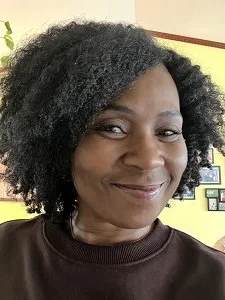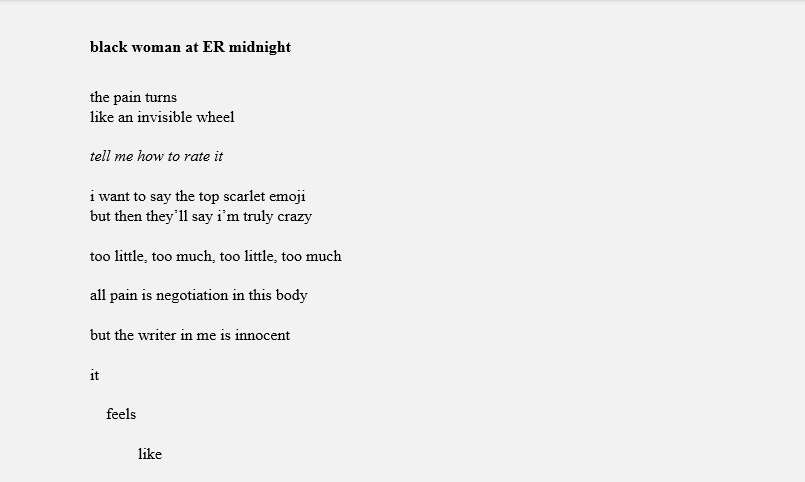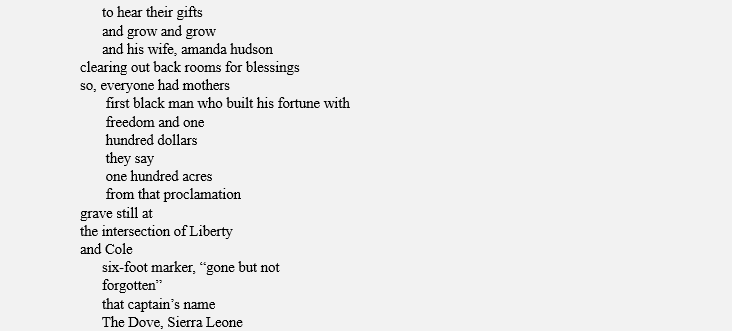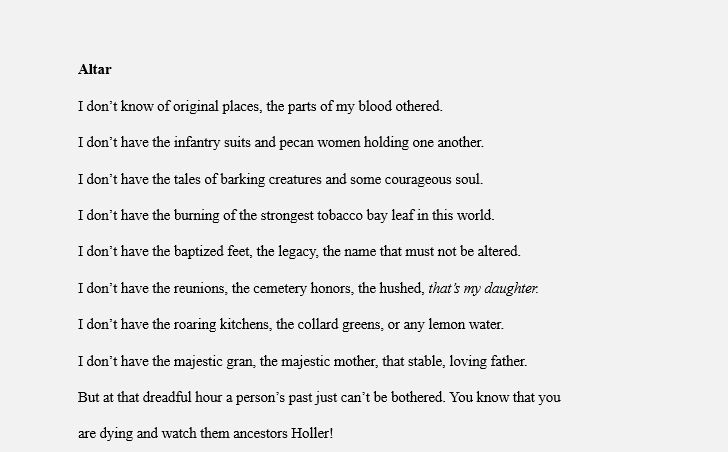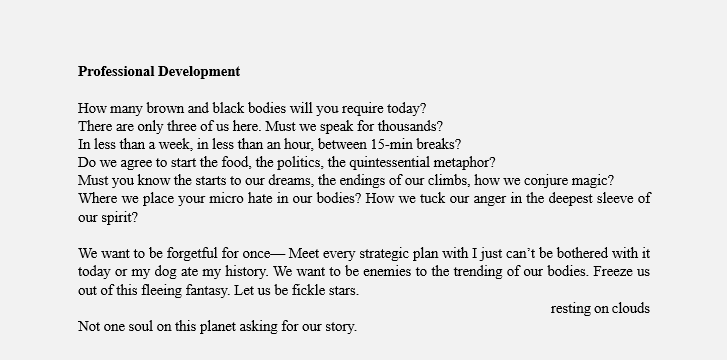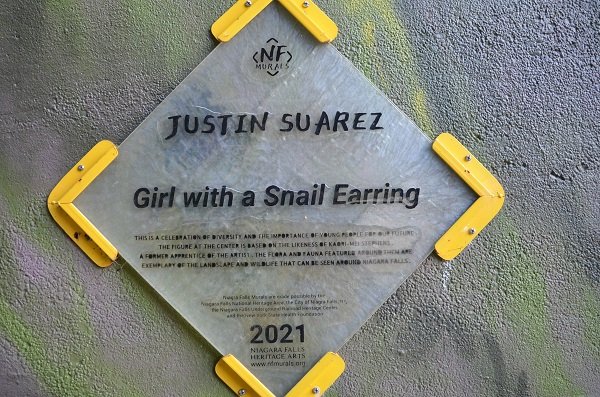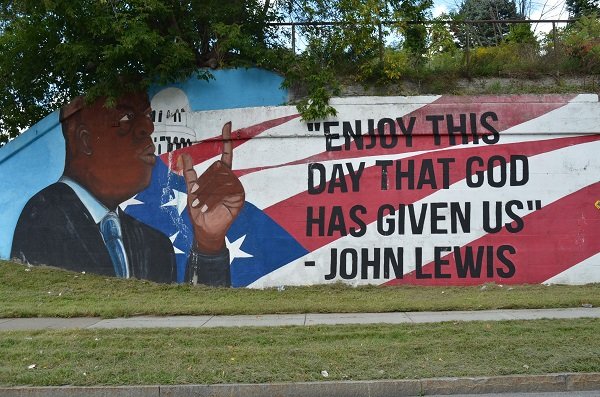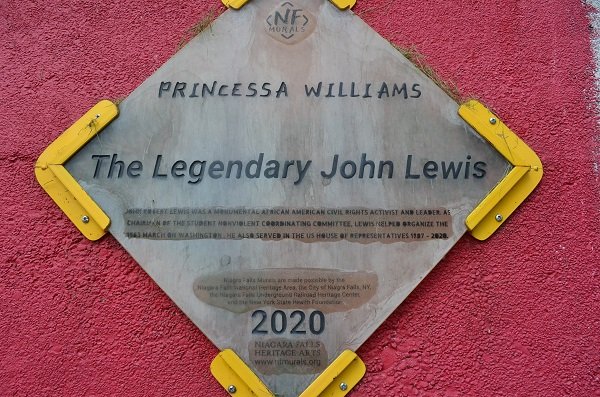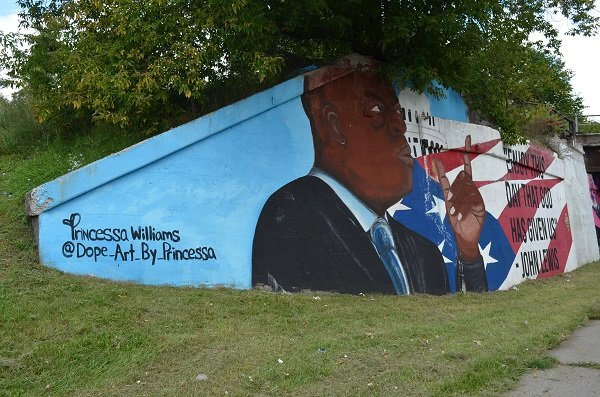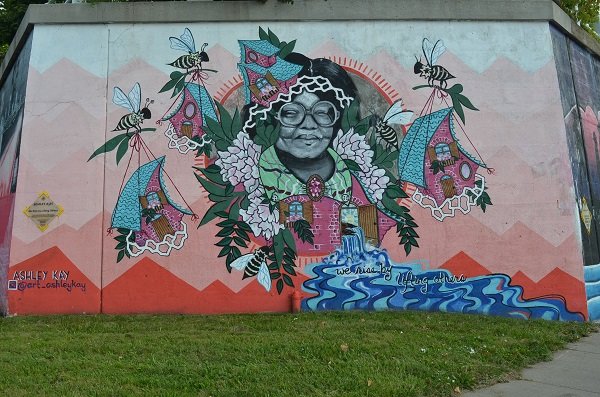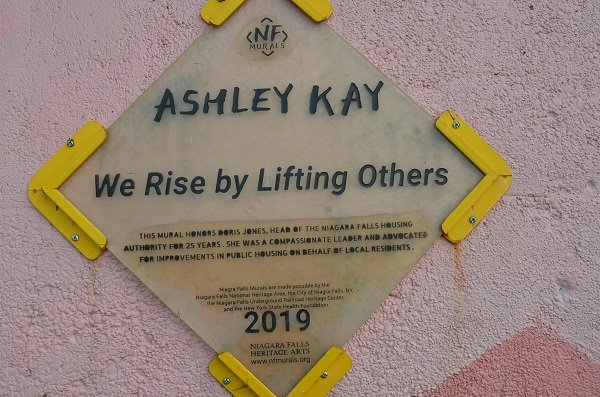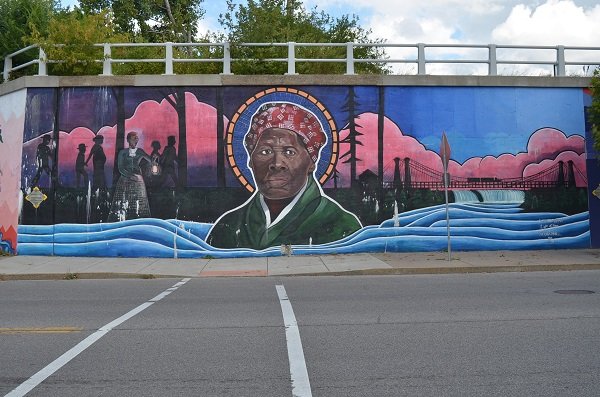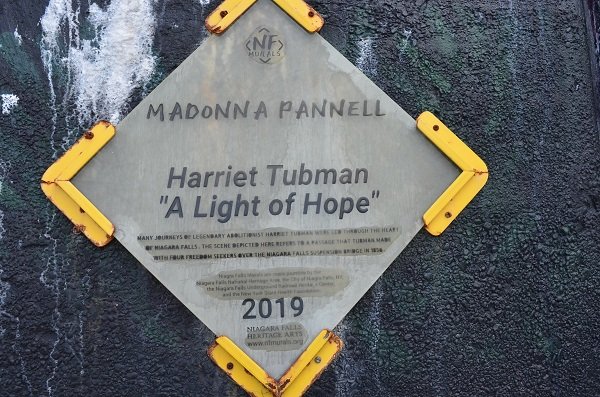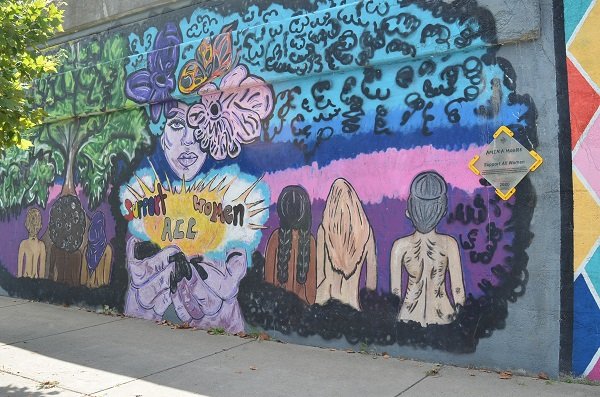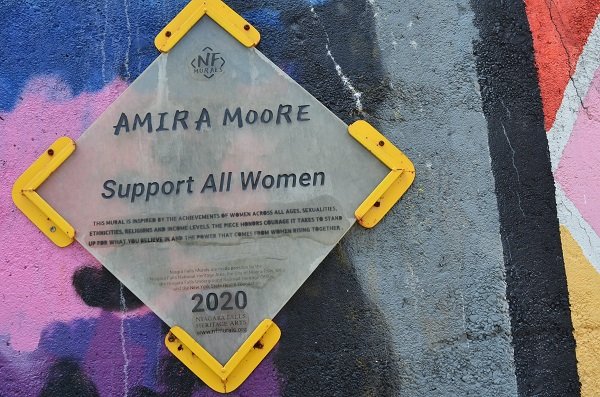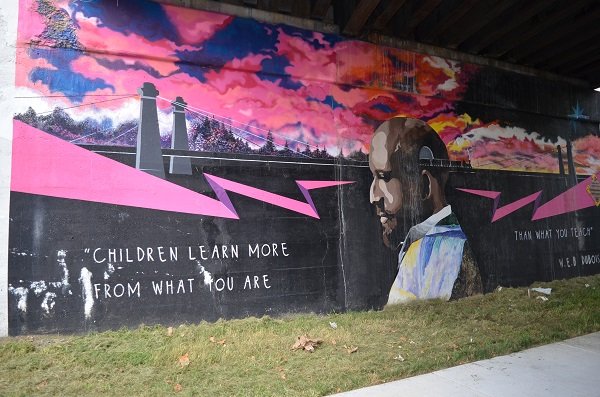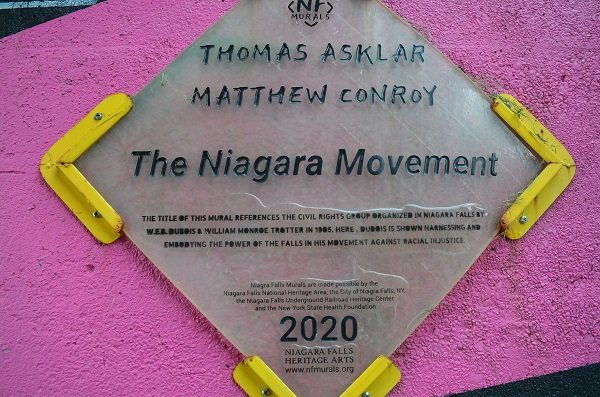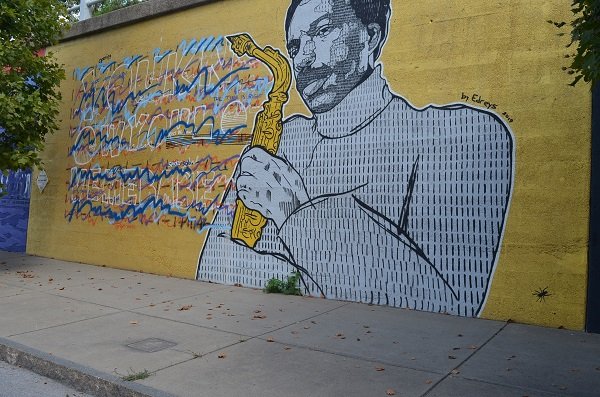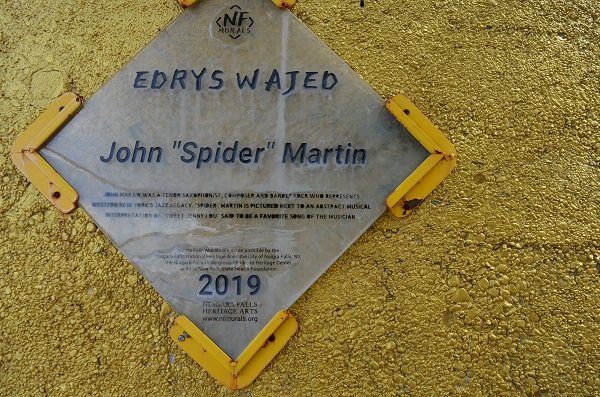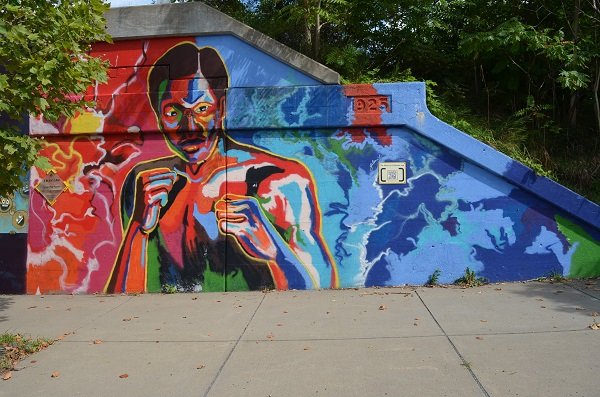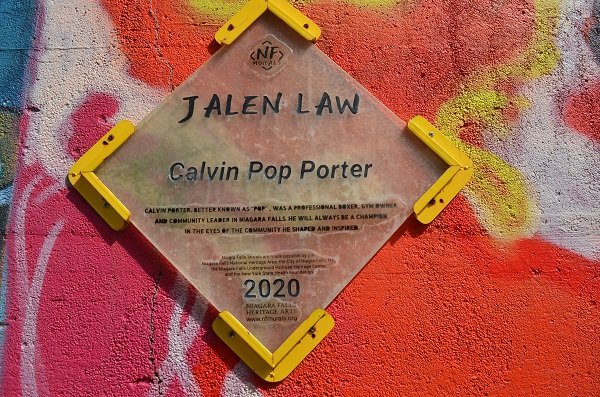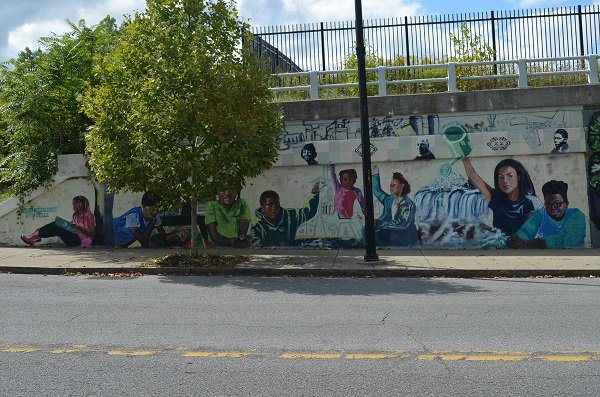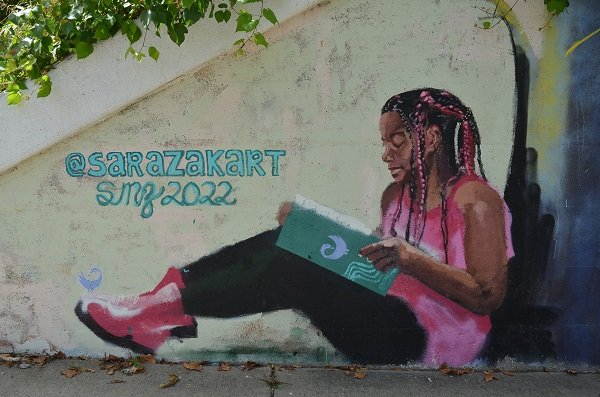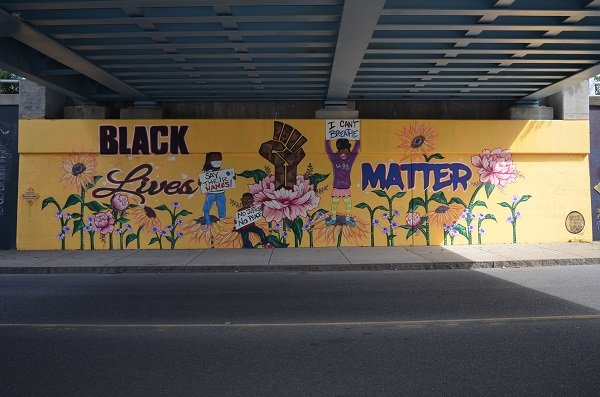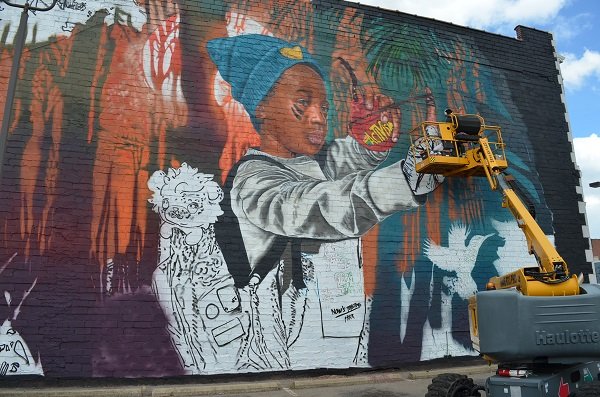Po’ Boy Blues
When I was home de
Sunshine seemed like gold.
When I was home de
Sunshine seemed like gold.
Since I come up North
Whole damn world’s turned cold.
I was a good boy,
Never done no wrong.
Yes, I was a good boy,
Never done no wrong.
But this world is weary
An’ de road is hard an’ long.
I fell in love with
A gal I thought was kind,
Fell in love with
A gal I thought was kind.
She made me lose ma money
An’ almost lose my mind.
Weary, weary,
Weary early in de morn.
Weary, weary,
Early, early in de morn.
I’s so weary
I wish I’d never been born.
Langston Hughes
MIDDAY RUSH
-ling-ling.
Ting-a-ling, ting-a-ling-ling.
The wispiness of chatter, the clackety clangs, the clickety clings of things, and the
continuous rings from the door chime soak the air.
Ting-a-ling, ting-a-ling.
"Okay, here's another small coffee and more homemade French Vanilla. And one small
café mocha with a double shot of chocolate. Can I get you anything else?"
No, I'm good. Thank you." Charles's folded hands are in front of him on a small round
cod grain table. He twirls his thumbs back four times and forwards four times. Again. Forward
four times and back four times. Again. Slow. Repetitively. And with precision. He only looks up
from his coffee cup and out the windows whenever tires roll over the wet parking lot pavement
outside.
Ting-a-ling, ting-a-ling-ling.
Ting-a-ling, ting-a-ling-ling.
The café hustles and bustles with an uppity air of I'm in a hurry foot traffic. As one
customer leaves, another enters. The seating is privately distant. Most seated customers have the
Please-Do-Not-Disturb-Me or the Can-You-Not-See-I'm-Busy-At-Work-Here type of vibe. And
a few are plugged into a computer, an iPhone, or some other device. But not Charles. Instead, he
slumps over in a comfortable, brown, high-back leather chair in the fourth row furthest from the
main entrance facing the four large, dark wood casement pane windows. With only his feelings
to occupy his heavy thoughts, he takes cautious sips from his coffee cup.
Out the windows, the rain moves into third gear as the minutes tick away. What was
once a faint mist is now a swift drizzle.
After a fifteen-minute wait of doing nothing but looking out and twirling, sipping,
and looking out and twirling. Again. He eyes a slow-approaching silver sedan claiming a
newly open parking spot while other drivers Kentucky Derby it out the parking lot as if they are
driving on dry land and free of hightailing pedestrians seeking refuge from spit shooting bullets.
Slow yet steady, Annabelle exits the sedan.
At first, Charles does not recognize her. Then suddenly his mind dims. It's like the
Sahara Desert here. He yanks at the neckline of his T-shirt several times, but the makeshift air
vent fails to cool him down enough to make a significant impact. He looks around again to see
if anyone else feels the sudden heat wave. But no one seems to be in distress. He then removes a
napkin that now finds itself hugging his coffee cup like a café advertisement logo sticker and
wipes the beads of sweat above his thick, dark, naturally tapered brows—the kind that most
women would die for. And now he tugs at his snugged red Superman T-shirt. Annabelle's
favorite. But as he deepens his breath intake, the iconic S rises off his chest as if a gust of wind
swooshes it back to life.
At last, she walks through the café lobby door. Annabelle is slow, yet steady on her feet.
At first clear sight of her, Charles is in between the states of amiss and bliss. Everything
he prepared to say to her had suddenly become a bad case of Alzheimer's. The only sign of life
that remains of him now are the rises and falls of the S on his chest. And although his vision
blurs, he never once loses sight of her as she mazes her way through the crowd. Still, slow yet
steady. Come on, man—you’ve practiced this in your head a million times already. Just stay
calm. And don’t mess this up!
Then a young mother struggles to maneuver her child's stroller and bumps into his table.
The French Vanilla creamer jar topples over and some even splash onto his forearm. As luck
would have it, the incident shifts his mind back into focus.
"Oh, I'm so sorry, sir! Please forgive me!” Her nerves are in plight mode and leap from
one chaotic emotion to the next. Nonstop. She reminds him of himself. She snatches several
napkins off his table. “Oh my gosh! Here! Please! Let me help you with that!”
“No. No worries.”
“I swear, the stupid wheels on this thing! How clumsy of me to have—"
“It’s quite alright. Really. There’s more French Vanilla where this came from. Trust me.
They won’t mind.”
"Oh no stop," she says to her toddler as she pulls his finger from his snotty nose and
wipes it as he choo-choos a small red toy train in her face! “And give me that, you rascal you.
It’s all wet and gooey.”
Charles adjusts his glasses. “Looks like you have your hands quite full there?”
“Oh, yes, I do to say the least. But he’s my little man.” Then she immediately attends to
his fingers and nose. Again. “You are mommy’s little man, right?”
She hands him back the train, and he picks up exactly where he left off before and choo-
choos it like he’s piloting a plane instead of driving on tracks. He choo-choos! CHOO-CHOO!
And choo-choos! CHOO-CHOO! And choo-choos! CHOO-CHOO! Nonstop! As if that’s the
only word he can articulate. That’s when Charles realizes that her little man is autistic. He smiles
at him. And her little man smiles the biggest sloppiest smile back and then offers him his toy
train as an invitation to join in on the fun. Charles playfully declines, but his heart melts like a
malted milkshake on the warmest May day.
“Looks like he really likes you.” Ask this nice man to be your daddy. Say, Dada! Dada!
“I’m so sorry about this mess again.”
What a great kid. “No, don’t think about it. See, already clean.” I’d do anything to have
one just like him. My own little man.
Ting-a-ling-a-ling.
Ting-a-ling.
After a swift cleanup, he immediately brings both of his hands to his face, blows his
breath into them, hurries a Listerine Cool Peppermint strip into his mouth and restores the small
pocketpak back in his coin pocket. Then to his surprise he notices Annabelle’s ankles more than
anything else about her. They look more like cankles that are about to burst any day now.
A large rustic magnetic A-frame chalkboard stands near the register. Fresh Hot Coffee
Always Available Here! is in large, red, and white, double-cursive letters, and beneath it is a
glossy internet replica of a cup of piping hot coffee. Annabelle's eyes dance with delight because
she loves the way the classic pungent and bitter smells of coffee beans, the sweet, melt in your
mouth pastries, the faintest scent of breakfast burritos from this morning’s mob, and the
unexpected, unmistakably scent of Fahrenheit by Christian Dior hit her nostrils. Delightful.
Always fresh. She feels like all the clashing aromas are washing her troubles away. She slowly
works her way through the crowd. A few people step aside or give her just enough space to slide
pass them with ease. Then now, she spots Charles. Trouble. Her smile fades.
He struggles to hide his nerves. He jumps to his feet and quickly waves her his way.
“Hey! Well, this pour-down is quite unexpected. So, I really do appreciate you coming out in all
this chaos.”
She gives him that Everything-About-You-Is-Just-Wrong look. He hesitates but reaches
out to kiss her, but she immediately pulls away. He overlooks it and makes another attempt to no
avail.
Within a matter of seconds, the rain pounds on the rooftop now, slapping everything in its
sight. Nothing is spared. The tree limbs grapple about while the leaves flurry into people's faces
as they struggle towards their destination or take refuge in boutiques, chain stores, or privately
owned specialty stores. Other shoppers flee into the safety of their vehicles. There is even a wild
runaway umbrella doing somersaults in the middle of traffic.
"Wow, this rain isn't so nice,” he continues.
"I didn't come to talk about the weather.”
"Well, you still look good anyway."
She flashes him an I-Do-Not-Give-A-Middle-Finger smile and looks him over from the
top of his clammy forehead to his dusty black and white checkered, high-top tennis shoes.
"Well, I wish I could say the same."
"Thank you," he smiles, bulges his chest, tugs at the bottom of his Superman T-shirt, and
sucks in his post-college, pre-fatherhood belly all at once.
The floral presence of her natural scent overtakes the aroma of freshly brewed coffee,
which provides him with the alert boost that he still so desperately needs because he shies at
making eye-to-eye contact with her. Instead, he looks over her shoulders and out the windows.
A loud bang magnifies several large white cracks in the sky.
The café lights flicker. Once. Twice. Three times.
Everyone, except for Charles, acts unfazed. That is when he realizes her dig. He just
stands there. Speechless. Defenseless. Accused. Guilty as charged and not knowing what to
do with his hands—but one jerks—his left and tugs at the bottom of his T-shirt. Everything
about him seems to melt into kryptonite. Nothing about him has a superhero appeal, not even the
iconic S on his chest. Then he smooths down his nape hair and appears awkward as a man
thinking that he’s standing next to his wife but accidentally kisses a strange woman on the lips.
Every other second, his heart constricts and craves nothing more than jumping out of his chest.
Annabelle just looks at him. Then waits. Oh my gosh, he is so very pitiful. She then
glances at the large coffee mug wall clock that is above the wall menu board. It is 12:33 p.m.
"Ahem." She clears her throat.
"Oh, my bad!" He then pulls out her chair.
She removes her gray, lightweight long-knit sweater and drapes it over the backrest. For a
moment, they sit facing one another, making superficial eye contact with everyone and
everything, including each other. He fears that his eyes will reveal that he is not ready to accept
her truth—since they never tend to agree on anything anymore anyway—while now, her eyes are
affixed and pierced straight through him like glass.
A barista shouts, "Gregory! Ticket number 228 for Gregory! 2-2-8!"
The clackety clangs and the clickety cling of things still filter in and out of his eardrums,
but the sound of his heartbeats breaks through the wispiness. However, the musical collaboration
soon retires its melancholy pace to beat furiously like a hot African drum in the sweltering heat.
And the once hustle and bustle foot traffic suddenly intensify and devitalizes in and out of thick
air out of anticipation for her, but anxiety for him.
Charles shifts about in his seat. The palms of his hands sweat like a boiler. So, he sneaks
them underneath the table and uses his pants as a dinner napkin. His personal space spins around.
Slow. At first. Then fast like a tornado. The time it takes for his heart to pump blood throughout
his body, everything dulls, except for Annabelle's natural sun-kissed glow. And his eyes fixate
on the rolling taps of her hypnotic mid-length dark purple fingernails striking the table like baby
grand piano keys. For a few seconds, he scans the café and does the same out the windows. But
he cannot resist. The rolling taps of her done-up nails never escaped his attention.
The taps!
The Taps!
The TAps!
The TAPs!
THe TAPS!
THE TAPS!
THE TAPS!
His mind drifts.
Everything fades to black.
He retreats and has an out-of-body experience.
From a distance, he sees himself. Seven. Safe. Alone but without a care in the world. A
little dirty but happy. Playing in his grandmother's front yard. Tossing up an old blue and yellow
Saint Louis Rams football in the air. Catching it. Every time. Then he sees his grandmother
standing on the porch with two nice cold glasses of lemonade. She smiles at him. She calls him
over. He smiles back at her, jukes, and scrambles in her direction, imitating his favorite running
back Marshall Faulk. Now he and she are drinking lemonade. He feels a sense of love and
protection wrapped up like a gift in her arms.
Ting-a-ling.
Ting-a-ling, ting-a-ling, ting-a-ling, ting-a-ling.
Charles’s childhood memory slowly reverts to him sitting in the café. He cannot help but
think of the love and protection he once felt are a far cry from his present situation. Annabelle
sighs and rechecks the time. But still, Charles’s mind minds only the mesmerizing showgirl
performance of her nails. Tiny pools of sweat gather at his armpits and descend into his
waistband.
Ting-a-ling, ting-a-ling, ting-a-ling-ling-ling.
Finally, the chime snatches him completely back from black. The haze lifts. He casually
looks at his wrist. His watch shows 12:38. It is only then he notices that Annabelle is not wearing
her ring. His body temperature jumps up two more degrees. But he decides against showing his
dismay. Instead, he remembers his therapist advice. He sucks in as much air as his lungs can take
in, holds his breath, and counts: One Mississippi . . . two Mississippi . . . three Mississippi . . .
four Mississippi . . . five Mississippi . . . six Mississippi . . . seven Mississippi . . . eight
Mississippi . . . nine Mississippi . . . and ten . . . seconds. Then he clears his throat and steals
another sip.
An arm's length away, Annabelle sits reserved. Composed. Her legs are crossed. The
top one swings ever so lightly. "So . . . you finally got me here. You want to talk. I'm here. So,
talk."
"Oh yes. Well, I've already taken the liberty and ordered you a mocha. I did remember
the double shot of chocolate too."
"I didn't come here for a mocha either."
"You're not going to make this easy for me, are you?"
"Easy? Oh, so I see. You got me here for easy? Thanks, but no thanks. That's my
cue." She rises out of her chair the best she can. He reaches over to help her balance, but she
quickly shushes his hand away and gives him a Do-Not-Even-Think-About-Touching-Me look.
“So, you know what, since you want to play games—boy, I'm out of here."
He darts out in front to block her path and accidentally knees the table hard. "Ouch! Got
darn it already."
The Today's Special: Homemade French Vanilla double-sided table tent
advertisement falls on its side, and the small sugar packages topple out of the white canister and
slingshot across the table too.
A few rows over, a loud, earthy-dressed middle-aged lady wearing a metallic silver
umbrella hat, a pair of oversized tan shades, and an outdated Android pressed against her ear
laughs hysterically. Charles envisions her as a Hindenburg hovering right over his left shoulder,
spying on him and all of humanity. Sensing his embarrassment, Annabelle tries not to but shakes
her head and proceeds to laugh too. "Oh my gosh! You're so clumsy. Are you okay?"
"No, of course not. Now, you see what you've made me do?"
For a moment, they both laugh as if they lived once upon a time in their near past.
But then she abruptly straight faces him. "Oh no you don't!" She retrieves her sweater,
but it slips from her grip and falls on the floor.
"What? Wait! Now, what did I do wrong this time?!
“Nothing at all. You’re just acting like your charming self—like always.” And I am not
about to fall for it this time around. Not even for a moment.
“But we were just laughing, though."
"Please move out my way." Laughing at your clumsiness is what got me knocked-up in
the first place.
"Okay, I surrender. I'm sorry."
An expression of disbelief crosses her face as if it’s rare for him to speak those words.
"No, really. I'm sorry. I am. I just started with those bad nerves of mine again. You
know how they can get me."
Tapping her foot, Annabelle looks up at him, but this time with a little less disbelief.
“Okay, but I'm not kidding around. Like I told you over the phone, I'm only giving you
ten minutes, and time does not wait for anyone, so tick-tock."
"Yeah, I know. Let's just sit back down. And do some real talking this time. I promise,
okay? He picks up her sweater. “Please?" He waits for her to sit before doing the same.
"Where’s the waitress?"
“I’ll keep an eye out.”
Annabelle brings her cup to her lips. "Well, I'm listening," she says after the first sip.
He clears his throat. "Yeah … okay, I guess I will be the first to start."
"Perfect, especially since you're the one that called me like the world is ending and
begged for me to be here, out in all this—and might I add, in my condition."
"Right. Well, first I just want to know when you're coming back home?"
Mocha jets out her mouth, across the table, all over his face, and slides down the S on his
chest. "Cold. Mocha's cold." She casually snatches a few napkins out of its dispenser. "My bad,
sweetie. Here. Do yourself a favor. Dry yourself off."
"Seriously?! Are you effing kidding me right now?"
"Well, are you? Is that the first thing you have to say to me is, ‘When are you coming
back home,’ after all this time apart? And you pick here of all places. And you're purposely
wearing that stupid T-shirt too. I know exactly what you're trying to do, Charles. As if any of its
going to work. Well, think again." He attempts to get in another say to no avail. “And by the
way, let me give you some advice. I’ll charge you for it later, you idiot! If I were a man, in your
predicament, walking in your shoes right now and speaking to a woman like me—that would be
the last thing to ask me is, ‘When are you coming back home?’ You got that Einstein? So, try
again."
"God damnit, Belle," he says underneath his breath and pats himself dry with the napkin!
"Can't you see I'm trying-dying here?" The only time he calls her Belle is when she puts up a
fight, which she rarely does. "Sit down." She crosses her arms over her belly and pouts her
lip. "Sit down and shut your big mouth, I said!" He grabs her by the arm and forces her to her
seat. "Now, you listen up. I did not ask you here to argue. We've done quite a bit of that already,
don't you think? That's the last thing I want for us. Besides, you're in no condition to be getting
upset over anything anyway."
Annabelle straight faces him. Again. But soon cracks under pressure. A single drop
struggles down her cheek. Then she burst into tears. Something rushes over her. Blame it on
hormones, missing him, being at their favorite café, thoughts of not winding up like her
miserable mother, or whatever. "I never wanted to leave. But you wouldn't listen. You never
do anymore. And you had already agreed to this a long time ago. But now, look at me. I'm a big
fat pig." He tries not to laugh. "Well, I am," she sniffles.
"Now, don't be ridiculous, Annabelle baby. You're as cute as the day I met you in Forest
Park."
She grabs a napkin and blows her nose. Again. “No, I'm not."
"Oh, yes you are." He smiles and squeezes her arm like a stress reliever balloon. "I
wouldn't too much worry about this. It's just mostly water weight anyway. You’ll lose it and be back in your sexy clothes and heels in no time."
She swats at him like he's a West Nile mosquito. "Oh my gosh, 'Water weight'? I just
can't with you! I swear you're not much of a prize yourself right now either, you know."
RATTLE-RATTLE-RATTLE! BANG! SMASH!
Charles and Annabelle look in the direction of all the commotion. Hidden behind a wall,
in the kitchen, the dishwasher attendant and dishes fight for position and reposition in the
dishwasher.
Then Annabelle snaps her head back towards him. "Is that your way of calling me fat?”
"No! No, of course not, baby! My bad. That's not what I meant. Sometimes I need to just
put my frigging foot in my frigging mouth.
Wow! That’s a vision.
“I never say the right words to you anymore. Everything just comes out completely
wrong."
"You think?"
"Yeah. But you know I'm not good at this talking stuff. What I'm trying to say is that
what we're going through, it's just a bump in the road."
She places her hands on her belly. "Oh, really? Just a bump?"
"Yeah, you know how hard our first year was. Come to find out, most couples' first year
is a doozy too—who knew? I also learned that we might have put too much pressure on one
another, like setting unrealistic expectations. Stockpiling negative emotions. Not listening." He
looks deeply into her eyes. "And like taking each other for granted. Failed promises. Not setting
aside quality time. The list is longer than my arm."
"Yeah, like no happy wife, no happy life, huh?"
"Exactly, but they’re all common mistakes. So, what it all really boils down to is that
we're just as normal as the next couple."
“Really? You don’t say.”
"They say all couples experience this from time to time throughout their relationship."
"Oh yeah? Well, who's they?"
"It's from these marriage counseling magazines I've been reading online for the three out
of five weeks you've been away. And I’ve read plenty about taking care of a baby too."
Their barista politely interrupts, "Can I get you anything else?"
Charles motions at Annabelle's cup, but she waves him off. "No. It looks like we're all
good here. Thanks."
She smiles at him and then at Annabelle.
"Wait, I'll have some ice, please," Annabelle says.
"Sure. Ice water"?
"No, just the ice. And in a large Styrofoam cup, please."
"Okay, no problem."
They wait until there is an adequate distance between them and her before they continue.
"I don't need some wannabe cyberspace marriage counselors giving me any advice about
you or our baby. I'm sane and mature to make that decision all on my own thank-you-very-
much.” Obviously, I cannot say the same for you.
"You haven't answered any of my calls, texts, emails. I had to see you. I was just going
mad. Completely mad. And your mom, you don’t have to make any excuses for her. I know she
hasn’t told you about my calls. It's a wonder why she doesn't have a husband and has been single
all her frigging life. She’s just a miserable thorn in my side. Is that her waiting for you in the
car?"
"You think it's been any easier on me? She acts like a pesty baby. No pun intended.”
“Well, I hope not because—
“Hey, look! I'm the one who’s living back with my mother, with no job, with no money,
no transportation, just a high school education—and might I add, you disconnected my cell
phone. So, yes, no calls either. I warned you this would happen to me."
"I didn't want this for us either. You know that, but things change. Life does have a say,
you know. And you also know how I feel about everything now.”
“But what about how I feel, Mr. All About Yourself?”
“We're just not that kind of people, though."
"What kind?"
"The kind that goes around giving up their baby to complete strangers. The kind that has
a baby running around on this Earth and just go on with their lives like nothing ever happened."
"Look, you knew this about me already. I'm just not maternal. I’m cursed, like mother,
like daughter.”
"Well, for our baby I'll be enough for both of us."
"But you even agreed—
"You're nothing like your mom, though. The witch! It's just all in your head. It's like she
has her broom hooked around your neck. A spell. And I’ll bet anything that she hasn’t given you
any of the things I brought to the house for you. Did she even tell you that I came many times
wanting to see you? Practically begging. No, of course not. You know, she’s partially to blame
for you walking out on me."
"No, you're mostly wrong about her.”
Charles picks up his spoon and taps the brim of his cup with it.
Annabelle places her hand on top of his to stop him. "Look, there's still time. It will
be our choice. Yours and mine. Together. We'll do this together. We can, you know, like
everything else before now. I've already got it narrowed down to two couples. They are really
good people, Charles. And I’m pretty sure you’ll like them too."
He abruptly snatches his hand from hers. “You will never get my approval on this, Belle!
You hear me? Never!”
Their barista approaches, carrying a tray with an array of beverages. She places a tall
glass of ice in front of Annabelle. "Alrighty, here we are. Just ice for you.” Then she puts a jar
of French Vanilla in front of Charles, “And I noticed that you’re out, so here’s more.” Annabelle
looks annoyed but decided not to say anything about the glass or the French Vanilla. “Is there
anything else I can get for you? Our grilled paninis are delicious."
Annabelle immediately tosses a cube into her mouth. "No, no, thank you."
"Okay, I'll be back in a bit to check on you."
"Thank you so much." Then she stares back at Charles.
"Have you not been listening, Belle? I am not handing over my child as if I’m signing
over the title to some beat-up jalopy—like the one waiting for you outside. And you're not
either. So, you might as well get that thought out of that pea-brain head of yours." He reaches
into his back pocket, pulls out a pamphlet, and slides it across the table. Without moving an inch,
she glances down at it. At the top, A Father's Right in Missouri is printed in bold black letters,
and underneath it is a black and white picture of a man smiling and holding a newborn in his
arms. "Besides, I am the child's biological father. I've been reading a lot on this parental stuff
online too. So, I know my rights."
Annabelle chomps down hard on the ice. With squinted eyes, she looks at him with pure
spite. His mere presence causes a cramping sensation in the pit of her stomach. However, she
fights through the sharp-bladed shocks without flinching an inch. The last thing she wants is for
him to raise any concern for her or the baby. Not even her obstetrician is aware of how persistent
they have become over the past few weeks. She then removes another napkin from the dispenser
and slowly wipes her tears. It quickly smears with makeup and dark mascara. So, she snatches
out another one and continues to wipe away. Her makeup blankets most of that napkin too. After
she gathers herself; she smiles at him as if nothing ever transpired. Then she clears her throat,
presses the used napkins inside of her half-filled cup of mocha until they are fully submerged,
straightens her posture and sits at the edge of her chair. CLAP- CLAP- CLAP! "Bravo, Einstein.
Aren't you quite the intellect now?"
"I'm just claiming what's rightfully mine too."
"Really? I don't think so."
He slides the pamphlet closer to her and retrieves his empty cup, and shields his mouth
with it. "Yes, I think so. Or else, Belle."
Her shoulders hunch. The pupils of her eyes flash an array of cold, dark winter colors.
"Or else what, Einstein?"
Einstein? Yeah, cute. You’ll learn to call me Master Einstein someday.
Just as quickly as it had disappeared, the hustle and bustle uppity air returns, and like in a
movie, every one of his sensory responses intensifies, and everything else magnifies. First, in
slow motion, a flea lands on his hand. Charles vividly sees every tiny movement and detail of its
body. Its big red eyes and an even bigger head. Its long fiber-like jointed legs. Its paper-thin,
transparent rainbow-colored wings. For the chit-chatting lady on her cell phone, seated on his
far-right, he lip-reads her every word. The clinks and clanks of spoons against coffee cups
pulsate his eardrums as they dance to the music. The fresh aroma of coffee beans roasting in the
back of the café hit his nostrils hard. Superman's shield clings to his chest like a child gripping
onto his mother's leg for dear life. And dark roasted coffee and a splash of French Vanilla, and a
hint of peppermint coats his tongue.
Ting-a-ling-a-ling, ting-a-ling-ling
“Ticket numbers 245, 246, and 247 for Marsha, Stephani, and Sam! 2-4-5, 2-4-6 and
2-4-7!”
Ting-a-ling, ting-a-ling-ling. Ting-a-ling, ting-a-ling.
A burst of laughter rushes into the lobby and quickly spills over into the café. Students.
Each one carries a cell phone and, dangling on their shoulder or across their chest, a backpack.
But it is the foot traffic and the constant ting-a-linging from the door chime that triggers
Charles mostly.
Annabelle glances at the mug clock. Again. She looks straight into his wild eyes.
Unshaken. "Well, it looks like we're all done here. What a waste of precious time."
"Don't you dare move from that seat, Belle; I mean it. You have no idea of what I am
capable of doing to you."
BEEP! BEEP!
She looks out the windows.
BEEPPP-BEEP! BEEP!
“The witch calls,” he says to her.
She tosses more ice cubes into her mouth. CHOMP, CHOMP, CHOMP! “Wow. Can you
believe it? The rain has cleared." She rises from her chair. Still in need of assistance, even more
now than before, but he gives her none. She takes up her sweater and says, "Now here comes the
sun. Good riddance, Charles."
"Don't count on it, Belle. Trust me. I'm not finished with you yet."
Ting-a-ling. Ting-a-ling.
Ting-a-ling. Ting-a-ling-ling.
Ting-a-ling.
With only his feelings to occupy his heavy thoughts, Charles sits there. Alone. Again.
At their favorite table. In their favorite café. His mind storms. God damnit! She's just like the
Mother Witch! So, he contemplates his next move while Annabelle shuffles through the crowd.
Slow, yet unsteady now. Charles’s mind minds only himself and no one notices her either. Then
he looks over his shoulders. Left. Right. And then left. Again. When his barista finally looks in
his direction, he motions his cup for another refill. She holds up two fingers. He signals back
one.
The hustle and bustle are busier than ever before now.
Ting-a-ling. Ting-a-ling. Ting-a-ling-ling-ling.
The midday sun rushes into the cafe. It reflects from one end of the table, across Charles's
forearms, to the other end of the table, and then it filters more light across the café. Another ray
reflects from his watch and blends in with the daylight elsewhere too. He looks down at his
wrist. It is now 12:45 p.m. Like clockwork, his hands are folded, resting in front of him on the
table. He twirls his thumbs back four times and forwards four times. Again. Forward four times
and back four times. Again. Fast. Repetitively. And with precision. He only looks up from his
coffee cup whenever another sudden outburst of laughter rings out from the tipsificators sitting in
a booth at the back of the café.
He then does his best to recoup any ounce of sanity left but with no avail. So, he does the
one thing he should have done prior to meeting with Annabelle. He pops a Xanax. Then another.
What the hell, one more for good measure. He pays no mind to those who pay mind to him while
doing so too. Slowly, he starts counting, but just as before, the Mississippies had no immediate
effect. And because of that he externally sides against his internal chit-chatter, and it shows in
real time, ranging from lukewarm to fiery syndicate colors. He boils.
Finally, he sees an envelope that is tucked between the fold of a napkin. For just a split
second, a sensational sense of hope washes over him. As he opens it, Annabelle’s ring falls out
into his palm. And just as quickly as it came, the sensation poofs into thin air. He’s pissed. He
then removes the letter. It reads:
Dear Charles,
Life takes many twists and turns, and some of them, if not
most are unexpected. I am sorry for what we have become. I am
not to blame, and neither are you. It just isn’t in the cards for
us anymore. And it would be unfair for anyone to bring children
into a world where their parents, especially us, are at odds with
one another. However, I will always cherish the good times we’ve
shared, but I can no longer be in a marriage like the one we have.
So instead, let’s both agree to do the right thing by giving our
unborn the kind of love that we could not provide one another.
We have no other choice but to go through with it. It is the only
way to make things right for everyone involved.
Sorry,
Annabelle
P.S. We’re having twins. Oh, craps! (But you would already know
that if you had come to “our” doctor’s appointment like you had
promised! But I’m sure it was your craps game that got in the way,
again. Right?)
May 2019
His eye swell. Because there is much truth in the words. But he knows that she did not
type the letter herself. That’s not the way she talks. I damn all mothers-in-law. A single tear
bleeds right through the word win in twins. Then he fists her ring, letter, and springs to his feet,
sailing the glass of ice and the jar of French Vanilla clear across the table and floor. He is in a
fury, but his high-tops feel as if they are glued to the floorboards.
At that moment, there’s a crash outside.
Everyone in the café stops dead in their tracks. Just for a split second, the silence is thick.
Foggy. Then some rushes to the window to see all the commotion. The entanglement.
Next, the double doors fling open. TING-A-LING-LING-LING!
“Quick. It’s a woman with child! Call 911!”
Little by little, Charles’s checkered shoes begin to slowly slack from the floorboards.
Still, he stands there stoic, but the S on his chest is statuesque. Out of respect for the woman with
child, his initial thought about the crash cannot be repeated. He quietly recites Po’ Boy’s Blues,
“‘The whole damn world’s turned cold …’” It’s his final thought about the whole ordeal before
putting it to rest.
Finally, Mr. Einstein—what he now calls himself—calmly takes his seat. As the world
dies or miscarriage all around him just right outside of their favorite café he twirls his thumbs
and waits ever so patiently for another fresh, piping hot refill as if nothing ever transpired
on what turns out to be a sunny May day mayday during the midday rush.
About the Author
Princess Anne Byrd-Treston
Princess Anne Byrd-Treston, an ambitious beloved mother of sixteen-year-old, Scholar Sincere Treston, describes herself as a jack of all trades, a master of none. However, she is passionate about writing fiction, and as an undergraduate student at Lindenwood University in Saint Charles, Missouri, Ms. Byrd-Treston received the 2011-2012 Linda L. Ross Creative Writing award for her stage play “Birdie and Willie.” Her literary interests include poetry, screenplays, stage plays, science fiction, and horror with African American and ambiguous characters. When she is not writing, Princess enjoys drinking too much coffee, quiet times at home, yoga, watching YouTube videos, pitching a jewelry line, chatting with her higher self, and people-watching. A natural-born ambivert that lives by the motto: Don’t get ready. Be ready. “Midday Rush” is her first publication, and she has an “arsenal of short stories and other works …[and] is equipped to jump into the pond of published authors.” Glimpsing her future, she sees herself as a full-time professional writer. Princess Anne Byrd-Treston currently resides in Saint Louis, Missouri, where the weather often displays all four seasons on any given day of the year.

